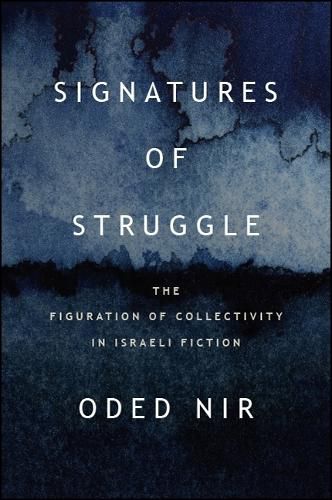Readings Newsletter
Become a Readings Member to make your shopping experience even easier.
Sign in or sign up for free!
You’re not far away from qualifying for FREE standard shipping within Australia
You’ve qualified for FREE standard shipping within Australia
The cart is loading…






This title is printed to order. This book may have been self-published. If so, we cannot guarantee the quality of the content. In the main most books will have gone through the editing process however some may not. We therefore suggest that you be aware of this before ordering this book. If in doubt check either the author or publisher’s details as we are unable to accept any returns unless they are faulty. Please contact us if you have any questions.
Signatures of Struggle offers a unique perspective on Israeli literature, bringing Marxist cultural critique to bear on a field from which it has hitherto been absent. Oded Nir moves beyond the dominant interpretive horizon of Israeli literary criticism: the relation of literature to national ideology. Rather than reproducing the usual narrative in which fiction resists the nation’s goals, Nir demonstrates how, in each historical moment, literary engagement with national ideology is a means to think through social tensions or contradictions internal to Israeli society-to solve in imagination problems that threaten the social order. Focusing on moments of transformation, Nir argues that the 1950s crisis of realism was the result of the failure, rather than the success, of the collective transformative project of the haluzim, the settler vanguard of Zionism. In the 1980s, the postmodern turn expressed a crisis of social imagination, whose origin was the incorporation of Palestinians into the Israeli economy after the 1967 war. Finally, he shows that the ways in which history is imaginatively reworked in contemporary Israeli fiction can only be understood through the context of 1950s and 1980s literature. Authors analyzed include Yigal Mossinsohn, Nathan Shaham, Hanoch Bartov, Yehudit Hendel, Orly Castel-Bloom, Yehudit Katzir, David Grossman, Yehoshua Kenaz, and Batya Gur.
$9.00 standard shipping within Australia
FREE standard shipping within Australia for orders over $100.00
Express & International shipping calculated at checkout
This title is printed to order. This book may have been self-published. If so, we cannot guarantee the quality of the content. In the main most books will have gone through the editing process however some may not. We therefore suggest that you be aware of this before ordering this book. If in doubt check either the author or publisher’s details as we are unable to accept any returns unless they are faulty. Please contact us if you have any questions.
Signatures of Struggle offers a unique perspective on Israeli literature, bringing Marxist cultural critique to bear on a field from which it has hitherto been absent. Oded Nir moves beyond the dominant interpretive horizon of Israeli literary criticism: the relation of literature to national ideology. Rather than reproducing the usual narrative in which fiction resists the nation’s goals, Nir demonstrates how, in each historical moment, literary engagement with national ideology is a means to think through social tensions or contradictions internal to Israeli society-to solve in imagination problems that threaten the social order. Focusing on moments of transformation, Nir argues that the 1950s crisis of realism was the result of the failure, rather than the success, of the collective transformative project of the haluzim, the settler vanguard of Zionism. In the 1980s, the postmodern turn expressed a crisis of social imagination, whose origin was the incorporation of Palestinians into the Israeli economy after the 1967 war. Finally, he shows that the ways in which history is imaginatively reworked in contemporary Israeli fiction can only be understood through the context of 1950s and 1980s literature. Authors analyzed include Yigal Mossinsohn, Nathan Shaham, Hanoch Bartov, Yehudit Hendel, Orly Castel-Bloom, Yehudit Katzir, David Grossman, Yehoshua Kenaz, and Batya Gur.